RBSE Solutions for Class 11 Maths Chapter 5 Complex Numbers and Quadratic Equations Miscellaneous Exercise
Rajasthan Board RBSE Solutions for Class 11 Maths Chapter 5 Complex Numbers and Quadratic Equations Miscellaneous Exercise Textbook Exercise Questions and Answers.
Rajasthan Board RBSE Solutions for Class 11 Maths in Hindi Medium & English Medium are part of RBSE Solutions for Class 11. Students can also read RBSE Class 11 Maths Important Questions for exam preparation. Students can also go through RBSE Class 11 Maths Notes to understand and remember the concepts easily.
RBSE Class 11 Maths Solutions Chapter 5 Complex Numbers and Quadratic Equations Miscellaneous Exercise
Question 1.
Evaluate \(\left[i^{18}+\left(\frac{1}{i}\right)^{25}\right]^3\).
Answer:
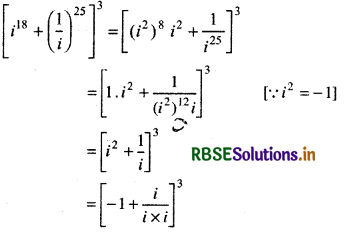
(Multiplying numerator and denominator by i in second term).
= [- 1 + \(\frac{i}{i^2}\)]3
= [- 1 - i]3 (∵ i2 = - 1)
= - [1 + i]3
=- [1 + 3i + 3i2 + i3]
[By expansion of(1 + i)3]
= - [1 + 3i - 3 + i2 . i]
= - [1 + 3i - 3 - 1 × i]
= - [- 2 + 3i - i]
= - [- 2 + 2i]
= 2 - 2i
Thus, \(\left[i^{18}+\left(\frac{1}{i}\right)^{25}\right]^3\) = 2 - 2i

Question 2.
For any two complex numbers z1 and z2, show that:
Re(z1z2) = Rez1 Rez2 - Imz1 Imz2
Answer:
Let z1 = x1 + iy1 and z2 = x2 + iy2
then z1z2 = (x1 + iy1) (x2 + iy2)
= (x1x2 + ix1y2 + iy1x2 + i2y1y2
= x1x2 + i(x1y2 + x2y1) - y2y1 (∵ i2 = - 1)
= (x1x2 - y1y2) + i(x1y2 + x2y1)
Then, real value of z1 z2
L.H.S Re(z1z2) = (x1x2 - y1y2) .............. (1)
(Since here i does not exist)
Again, Rez1, Rez2 - Imz1 Imz2
Real z1 (Rez1) = x1 (z1 = x1 + iy1)
and real z2,(Rez2) = x2 (z2 = x2 + iy2) .
and imaginary z1, (Im z1) = y1 (z1 = x1 + iy1)
and imaginary z2(Imz2) = y2 (z2 = x2 + iy2)
and (Rez1) Re(z2) - (Imz1) (Imz2)
= x1x2 - y1y2
= Re (z1z2) [From equation (I)]
Thus Re(z1z2) = (Rez1) (Rez2) - (Im z1) (Im z2)
Hence proved

Question 3.
Reduce \(\left(\frac{1}{1-4 i}-\frac{2}{1+i}\right)\left(\frac{3-4 i}{5+i}\right)\) to the standard form.
Answer:
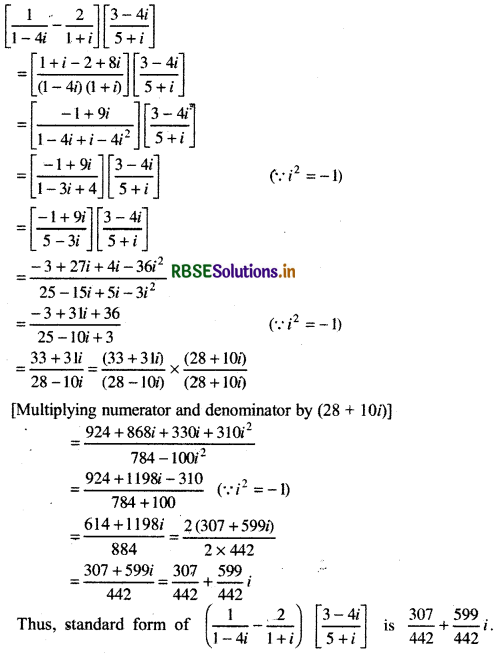
Second Method:
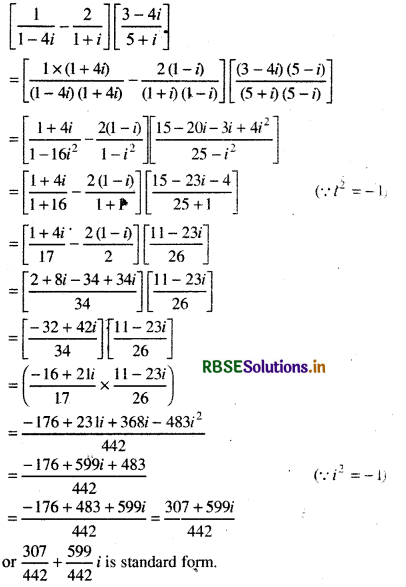

Question 4.
If x - iy = \(\sqrt{\frac{a-i b}{c-i d}}\), prove that (x2 + y2)2 = \(\frac{a^2+b^2}{c^2+d^2}\).
Answer:
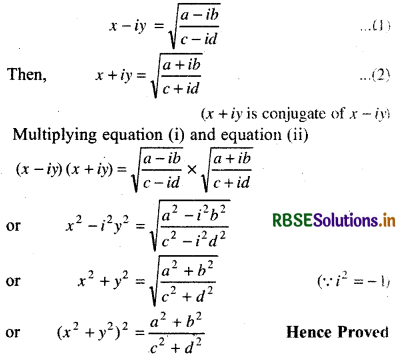
Question 5.
Convert the following into polar form:
(i) \(\frac{1+7 i}{(2-i)^2}\)
Answer:
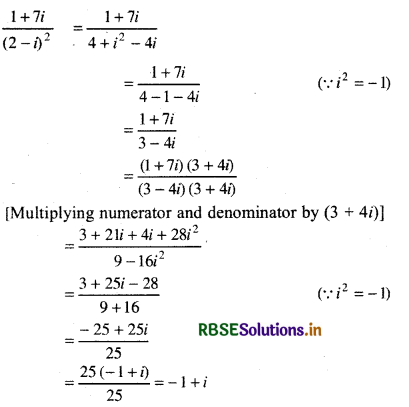
Which will be represent in second quadrant.
Since in second quadrant X-axis is +ve and Y-axis is -ve.
Then, given expression = \(\frac{1+7 i}{(2-i)^2}\) = - 1 + i.
Let - 1 + i = r(cos θ + i sin θ)
⇒ - 1 + i = r cos θ + i(r sin θ)
Comparing real and imaginary parts on both sides
r cos θ = - 1 and r sin θ = 1
Squaring and adding,
r2 (cos2 θ + sin2 θ) = 1 + 1
or r2 = 2
∴ r = √2
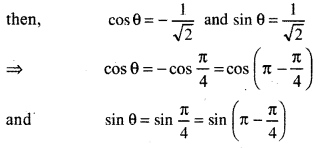
We see that value of cos θ is - ve ⇒ θ will lie in 2nd or 3rd quadrant and value of sin θ + ve ⇒ θ will lie in 1st or 2nd quadrant ⇒ θ will lie in 2nd quadrant and graphical representation of complex number - 1 + i will be in 2nd quadrant.
Thus, θ = \(\frac{3 \pi}{4}\) (∵\(\frac{3 \pi}{4}\) = 135°)
sin 135° = \(\frac{1}{\sqrt{2}}\)
cos 135° = - \(\frac{1}{\sqrt{2}}\)
Then polar form of given expression will be √2 \(\left(\cos \frac{3 \pi}{4}+i \sin \frac{3 \pi}{4}\right)\).

(ii) \(\frac{1+3 i}{1-2 i}\)
Answer:
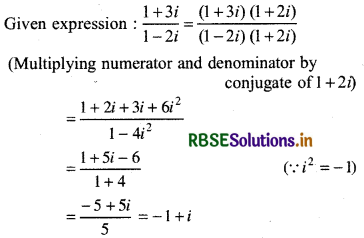
Which will be represented in 2nd quadrant. Since in 2nd quadrant X-axis is +ve and Y axis -ve.
Then given expression \(\frac{1+3 i}{1-2 i}\) = - 1 + i
Let - 1 + i = r(cos θ + i sin θ)
⇒ - 1 + i = r cos θ + i(r sin θ)
Comparing real and imaginary parts on both sides
r cos θ = - 1 and r sin θ = 1
Squaring and adding,
r2 cos2 θ + r2 sin2 θ = 1 + 1
or r2 (cos2 θ + sin2 θ) = 2
or r2 = 2 (∵ cos2 θ + sin2 θ = 1)
∴ r = √2
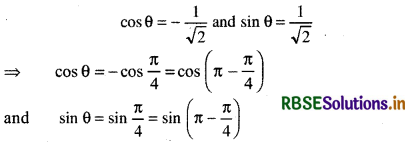
We see that value of cos θ is - ve then θ will lie in 2nd or 3rd quadrant and value of sin θ +ve then θ will lie in 1st or 2nd quadrant, z will lie in 2nd quadrant.
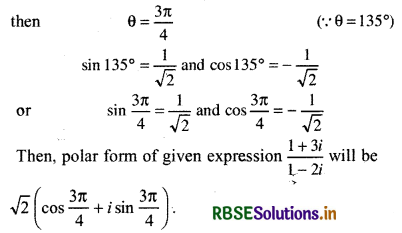
Solve each of the equation in exercise 6 to 9.

Question 6.
3x2 - 4x + \(\frac{20}{3}\) = 0
Answer:
Given equation: 3x2 - 4x + \(\frac{20}{3}\) = 0
or \(\frac{9 x^2-12 x+20}{3}\) = 0
or 9x2 - 12x + 20 = 0 .......... (1)
Comparing with ax2 + bx + c = 0
a = 9, b = - 12, c = 20
then discriminant D = b2 - 4ac
= (- 12)2 - 4 × 9 × 20
= 144 - 720
D = - 576 < 0. i.e.. negative
Thus, solution of equation
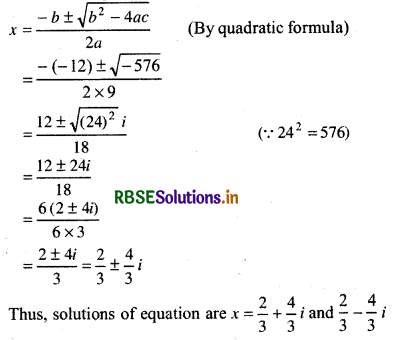
Question 7.
x2 - 2x + \(\frac{3}{2}\) = 0
Answer:
Given equation: x2 - 2x + \(\frac{3}{2}\) = 0
or 2x2 - 4x + 3 = 0 ............. (i)
Comparing given equation by ax2 + bx + c = 0
a = 2, b = - 4, c = 3
Discriminant of equation is D = b2 - 4ac
or D = (- 4)2 - 4 × 2 × 3
= 16 - 24
D = - 8 < 0 (Negative)
Now solution of equation
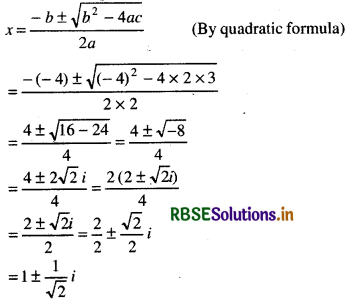
Thus, solutions of given equation (Taking +ve and -ve values separately) are
x = 1 + \(\frac{1}{\sqrt{2}}\)i, 1 - \(\frac{1}{\sqrt{2}}\)i

Question 8.
27x2 - 10x + 10
Answer:
Comparing 27x2 - 10x + 1 = 0, with
ax2 + bx + c = 0
a = 27, b = - 10, c = 1
Then, discriminant of equation
D = b2 - 4ac
= (- 10)2 4 × 27 × 1
= 100 - 108
Thus, solution of equation
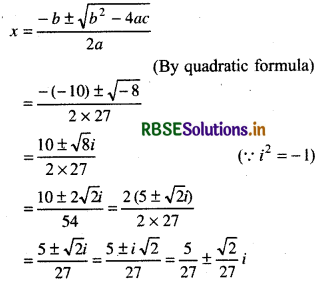
Thus, solutions of given equation (taking +ve and -ve values separately) are
x = \(\frac{5}{27}+\frac{\sqrt{2}}{27}\) i, \(\frac{5}{27}-\frac{\sqrt{2}}{27}\) i
Question 9.
21x2 - 28x + 10 = 0
Answer:
Comparing with 21x2 - 28x + 10 = 0
ax2 + bx + c = 0
a = 21, b = - 28, c = 10
Then, discriminant of equation
D = b2 - 4ac
= (- 28)2 - 4 × 21 × 10
= 784 - 840
= - 56 = 56i2 < 0 [∵ i2 = - 1]
Thus, solution of equation
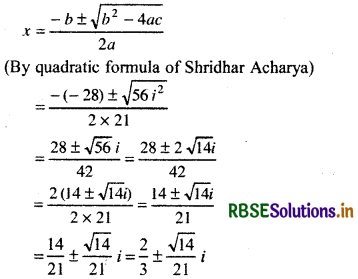
Thus, solutions of given equation (taking +ve and -ve values separately) are
x = \(\frac{2}{3}+\frac{\sqrt{14}}{21}\) i, \(\frac{2}{3}-\frac{\sqrt{14}}{21}\) i

Question 10.
If z1 = 2 - i, z2 = 1 + i, find \(\left|\frac{z_1+z_2+1}{z_1-z_2+1}\right|\).
Answer:
z1 + z2 + 1 = 2 - i + 1 + i + 1 = 4
z1 - z2 + i = 2 - i - (1 + i) + i
z1 - z2 + 1 = 2 - 2i
So, therefore
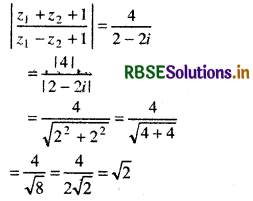
Question 11.
If a + ib = \(\frac{(x+i)^2}{\left(2 x^2+1\right)}\) prove that:
a2 + b2 = \(\frac{\left(x^2+1\right)^2}{\left(2 x^2+1\right)^2}\)
Answer:
Given,
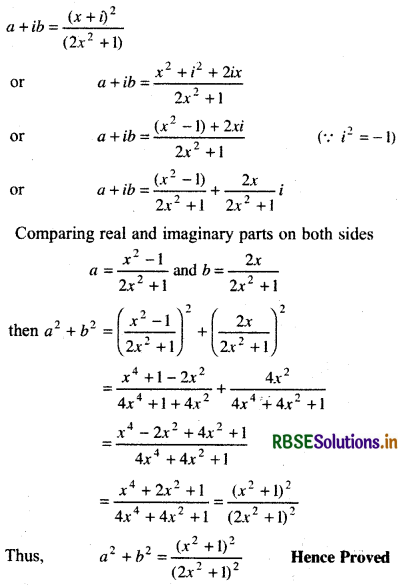
Second Method:
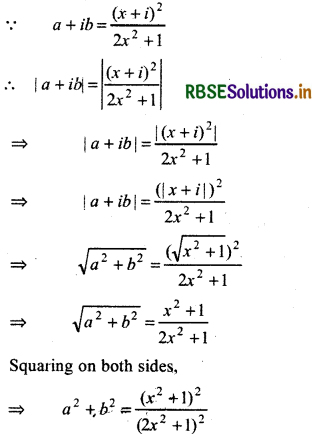

Question 12.
Let z1 = 2 - i, z2 = - 2 + i, find:
(i) Re\(\left(\frac{z_1 z_2}{\bar{z}_1}\right)\)
Answer:
z1 = 2 - i and z2 = - 2 + i
Thus, z̄1 = 2 + i
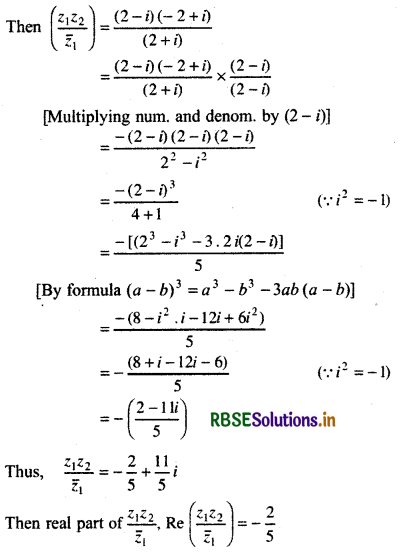
(ii) Im\(\left(\frac{1}{z_1 \bar{z}_1}\right)\)
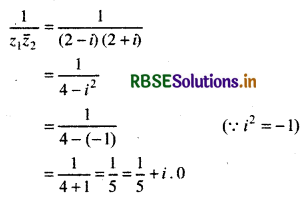
Thus, imaginary part of \(\frac{1}{z_1 \bar{z}_1}\), Im\(\left(\frac{1}{z_1 \bar{z}_1}\right)\) = 0

Question 13.
Find the modulus and argument of complex number \(\frac{1+2 i}{1-3 i}\).
Answer:
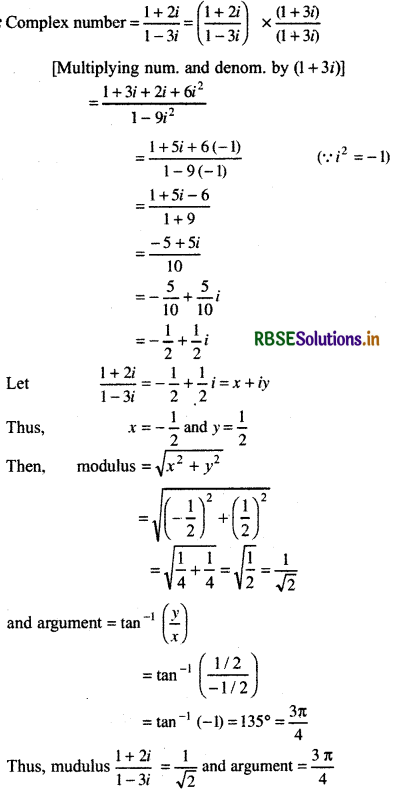

Question 14.
Find the real numbers x and y. If (x - iy) (3 + 5i) is the conjugate of - 6 - 24i.
Answer:
Given, (x - iy) (3 + 5i) is conjugate of complex number - 6 - 24i
∴ (x - iy) (3 + 5i) = - 6 + 24i
[Since conjugate of - 6 - 24i is - 6 + 24i]
or 3x - 3yi + 5ix - 5yi2 = - 6 + 24i
or (3x + 5y) + (5x - 3y)i = - 6 + 24i
Comparing real and imaginary parts on both sides
3x + 5y = - 6 ............ (1)
5x - 3y = 24 .............. (2)
Multiply equation (1) by 3 and (2) by 5 and adding
9x + 15y = - 18
25x - 15y = 120
34x = 102
or x = \(\frac{102}{34}\)
34
∴ x = 3
Putting value of x in equation (i)
3 × 3 + 5y = -6
or 9 + 5y = - 6
or 5y = - 6 - 9
or 5y = - 15
∴ y = - 3
Thus, real numbers are x = 3, y = - 3
Question 15.
Find the modulus of \(\frac{1+i}{1-i}\)-\(\frac{1-i}{1+i}\).
Answer:
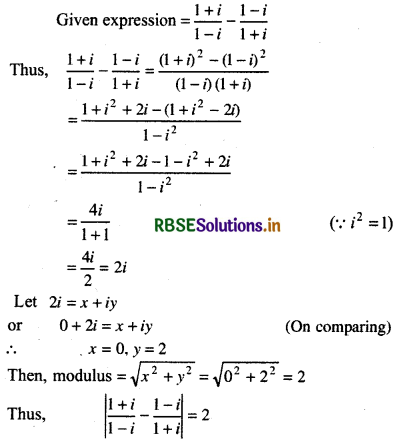

Question 16.
If (x + iy)3 = u + iv, then show that
\(\frac{u}{x}+\frac{v}{y}\) = 4(x2 - y2)
Answer:
Given (x + iy)3 = u + iv
Thus, x3 + i3y3 + 3x .iy(x + iy) = u + iv
[∵ (a + b)3 = a3 + b3 + 3ab(a + b)]
or x3 + i2iy3 + 3x2yi + 3xy2 i2 = u + iv (∵ i2 = - 1)
or x3 - iy3 + 3x2yi - 3xy2 = u + iv
or (x3 - 3xy2) + (3x2y - y3)i = u + iv
Comparing real and imaginary parts on both sides
x3 - 3xy2 = u and 3x2y - y3 = v
or x(x2 - 3y2) = u and y(3x2 - y2) = v
or (x2 - 3y2) = \(\frac{u}{x}\) and (3x2 - y2) = \(\frac{v}{y}\)
Adding, \(\frac{u}{x}+\frac{v}{y}\) = x2 - 3y2 + 3x2 - y2
= 4x2 - 4y2 = 4(x2 - y2)
Thus, \(\frac{u}{x}+\frac{v}{y}\) = 4(x2 - y2)
Hence Proved.
Question 17.
If α and β are different complex numbers with |β| = 1, then find \(\left|\frac{\beta-\alpha}{1-\bar{\alpha} \beta}\right|\).
Answer:
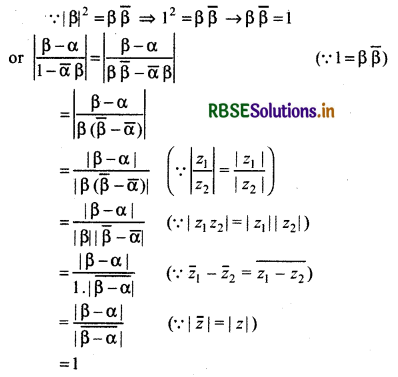
Question 18.
Find the number of non-zero integer solutions of the equation |1 - i|x = 2x
Answer:
Given |1 - i|x = 2x
Now, |1 - i| = \(\sqrt{1^2+(-1)^2}\) = √2 = 21/2
Thus, given equation
|1 - i|x = 2x
2x/2 = 2x
Comparing power on both sides
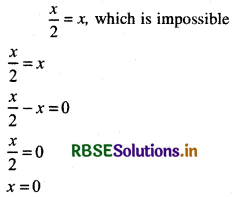
Root is = 0
So, therefore there is no non-zero integral value of x.
Question 19.
If (a + ib) (c + id) (e + if) (g + ih) = A + iB, then show that:
(a2 + b2) (c2 + d2) (e2 + f2) (g2 + h2) = A2 + B2
Answer:
Since,
(a + ib) (c + id) (e + if) (g + ih) = A + iB
So, |(a + ib) (c + id) (e + if) (g + ih)| = |A + iB|
Since, |z1 z2| = |z1| |z2|
∴ |(a + ib)| |(c + id)| |(e + if)| |(g + ih)| = |A + iB|
or \(\sqrt{\left(a^2+b^2\right)} \sqrt{\left(c^2+d^2\right)} \sqrt{e^2+f^2} \sqrt{g^2+h^2}\) = \(\sqrt{A^2+B^2}\)
Hence Proved.

Question 20.
If \(\left(\frac{1+i}{1-i}\right)^m\) = 1, then find the least positive integral value of m.
Answer:
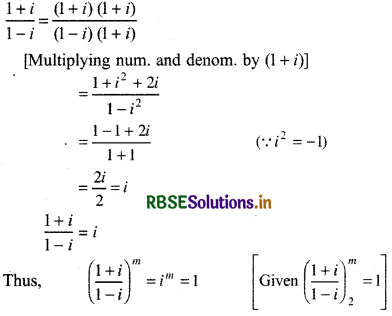
⇒ im = 1 or im = (i)4k
It is possible only when m = 4k,
where m is a positive integer
Since, i2 = - 1
i4 = (i2)2 = (- 1)2 = 1
thus, minimum integer value = 4 × 1 = 4

- RBSE Solutions for Class 11 Maths Chapter 3 त्रिकोणमितीय फलन Ex 3.1
- RBSE Solutions for Class 11 Maths Chapter 2 संबंध एवं फलन विविध प्रश्नावली
- RBSE Solutions for Class 11 Maths Chapter 2 संबंध एवं फलन Ex 2.3
- RBSE Solutions for Class 11 Maths Chapter 2 संबंध एवं फलन Ex 2.2
- RBSE Solutions for Class 11 Maths Chapter 2 संबंध एवं फलन Ex 2.1
- RBSE Solutions for Class 11 Maths Chapter 1 समुच्चय विविध प्रश्नावली
- RBSE Solutions for Class 11 Maths Chapter 1 समुच्चय Ex 1.6
- RBSE Solutions for Class 11 Maths Chapter 1 समुच्चय Ex 1.5
- RBSE Solutions for Class 11 Maths Chapter 1 समुच्चय Ex 1.4
- RBSE Solutions for Class 11 Maths Chapter 1 समुच्चय Ex 1.3
- RBSE Solutions for Class 11 Maths Chapter 1 समुच्चय Ex 1.2